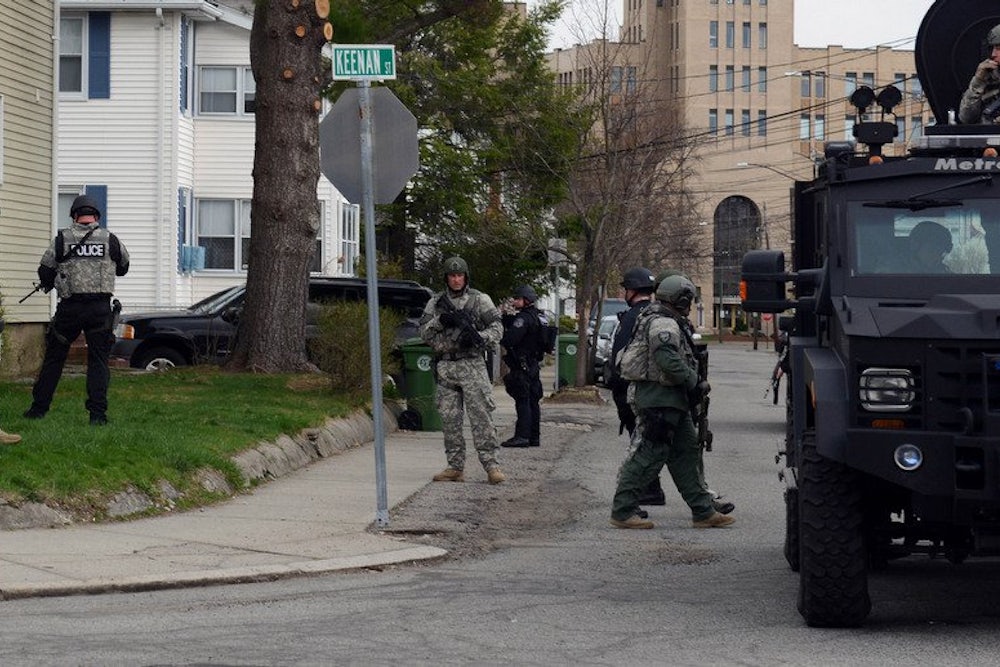This morning, Boston residents—and people in the neighboring communities of Cambridge, Newton, Waltham, Belmont, and Watertown—awoke to the command that they “shelter in place.” A manhunt for a suspect in the bombing at Monday’s Boston Marathon was underway. Public transportation was suspended, taxis barred from the streets, businesses shuttered, and classes cancelled. Over 650,000 people were told to stay inside. Boston was on lockdown.
This looks at least a little familiar. Just this fall, East Coasters from New England to Washington, D.C. found themselves housebound as Hurricane Sandy swept through. As emergency consultant Steve Davis put it, “These kinds of massive shutdowns of systems are usually the plans in place for natural hazards” (or theoretically, biological disasters or nuclear accidents). Weather halts life in our biggest metropolitan centers, top to bottom, but a single suspect, even an armed and dangerous one, never has before. The plans drawn up for wide-scale shutdowns are usually preparations for earthquakes, tornadoes, storms, and the like, Davis said, though large cities like Boston receive extensive FEMA grants to prepare for terror attacks, too. Boston’s emergency preparedness department did not return requests for comment about the plans it worked off this week, but in short, today’s empty streets were more reminiscent of Hurricane Sandy than Sandy Hook.
According to the assistant general manager for emergencies in Los Angeles, Anna Burton, crime usually shuts down cities in swathes, neighborhood by neighborhood. A 1997 armed robbery in Hollywood closed down the east San Fernando Valley, but not the whole city. A pair of snipers slowed activity in the D.C. area for weeks in 2002, but businesses brought in outdoor seating rather than close. The lockdowns that accompany school shootings, including the horrors at Virginia Tech, are largely confined to campuses.
And on the day inevitably recalled by the Boston bombings, September 11, people across the country rushed homewards instead of hunkering down. As D.C.’s director of Homeland Security and Emergency Management Agency (HSEMA), Chris Geldart, told me, “the whole notion of shelter in place” for emergencies caused by crime, not weather, didn’t yet exist. If the Boston lockdown has no precedent, it’s at least in part because it’s the largest terror attack on U.S. soil since 2001.
“A lot of lessons have been learned since 9/11,” Geldart said. Explaining that he agreed with his Boston counterpart Rene Fielding’s decision to shut down the whole city, he added that the surviving Boston suspect, Dzhokhar Tsarnaev, is vastly different from any other armed shooter. “When you have someone who has shown that they can do large acts, like at the marathon…this is why the police shut down the streets. When you have a mass casualty type of event showing a wanton desire to wreak that much damage, it makes sense,” he said.
There are compelling reasons to avoid shutting down a whole city. People need food, water, and medicine. Unlike New Yorkers facing Hurricane Sandy, Bostonians today had no chance to stockpile and prepare. A daylong disruption can have a steep cost—The Fiscal Times estimated that this shutdown could cost the Boston area $1 billion, and Burton told me L.A. avoids shutting down its sea and airports, even after an earthquake. But members of the security community today voiced support for Boston’s unusual measure.
Today, the people of Watertown, where Tsarnaev is thought to be hiding, watched men in military fatigues patrol through their windows and tweeted that it all felt “surreal,” like a “nightmare.” Though a “shelter in place” command frees cops and investigators to do their jobs, Geldart said, the isolation and boredom can foment anxiety. It’s impossible to say if cities will shut down like this to keep citizens safe in the future, but it may be that only a terror attack could justify a tactic that so widely augments fear. The pictures of Boston’s empty streets are so eerie, it takes effort to remember that very soon, they will be full again.
Follow me @ncaplanbricker.
